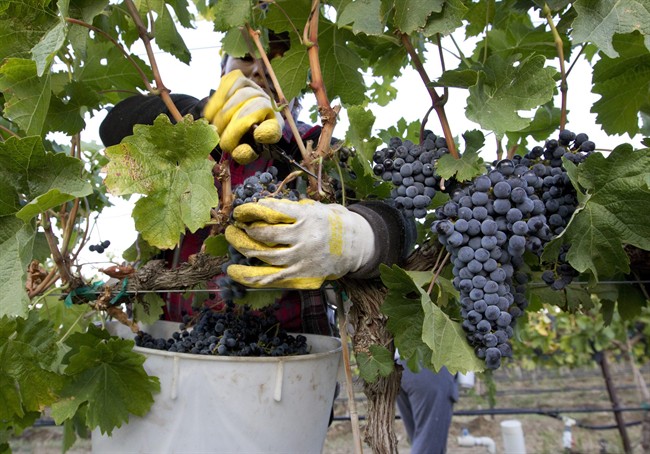More than double the amount of average rainfall recorded in the South Okanagan last month has washed away winemaker’s hopes of a perfect vintage.

Environment Canada said 61 millimetres of precipitation fell in Penticton, B.C., in September, compared to the monthly average of 24.6 millimetres. It was the sixth wettest September in more than a century.
“Pretty much the worst time to have rain,” said John Bayley, vineyard manager at Blasted Church and president of the B.C. Grapegrowers’ Association.
The wine harvest runs from late August/early September to November for some varietals and the deluge of prolonged rainfall challenged winemakers and viticulturists.

In Vernon, 47.8 millimeters of rain fell in September, compared to the monthly average of 37.3 millimetres. Kelowna recorded 40.8 millimeters of rain compared to the normal amount of 32.4 millimetres.
“The first week of September was pretty nice and then the rain turned on and it didn’t stop until recently,” Bayley said. “That slows down the maturity process and also introduces a strong risk of mildew and rot.”

Get daily National news
The cool, wet weather delayed the ripening process of the wine grape, lowering sugar and alcohol content in some cases.
“What we really saw happen, probably most significantly for our whites, is the sugar, how it would normally increase, it was a lot slower this year and inevitably with rain and with mildew we had to do a few earlier picks,” Bayley said.
Two significant frost events also created some difficulties for grape growers.
“The leaves in the canopies die because of the frost and so they fall off. The maturity process for the reds just stops because it loses the powerhouse which is the leaves,” he said.

And while temperatures dropped, it wasn’t cold enough to produce ice wine.
“It wasn’t an ice wine freeze so it unfortunately wasn’t good in that way,” Bayley said.
In addition to the rain and frost, Bayley said he noticed an increase in bird populations posing a risk to the vines and provoking rot.
Despite the challenges, Bayley said the Okanagan did not experience thick smoke or extreme heat as in previous years, so he is optimistic winemakers can still produce a quality wine this season.
“We’re going to see more balanced alcohol, some really beautiful acids, we’re going to get some really good wines,” he said.
“I think overall though, this is a very challenging vintage for viticulturists and winemakers alike,” Bayley added.
“By no means is it going to be our best vintage ever.”
- Attack on Iran triggers global flight disruptions, impacts Canadian travellers
- Queen’s University students stranded in Doha after Iran attack shuts down airspace
- Carney calls for protection of civilians as U.S., Israel strike Iran
- WWE Hall of Fame ring belonging to wrestling legend recovered after stolen








Comments
Want to discuss? Please read our Commenting Policy first.